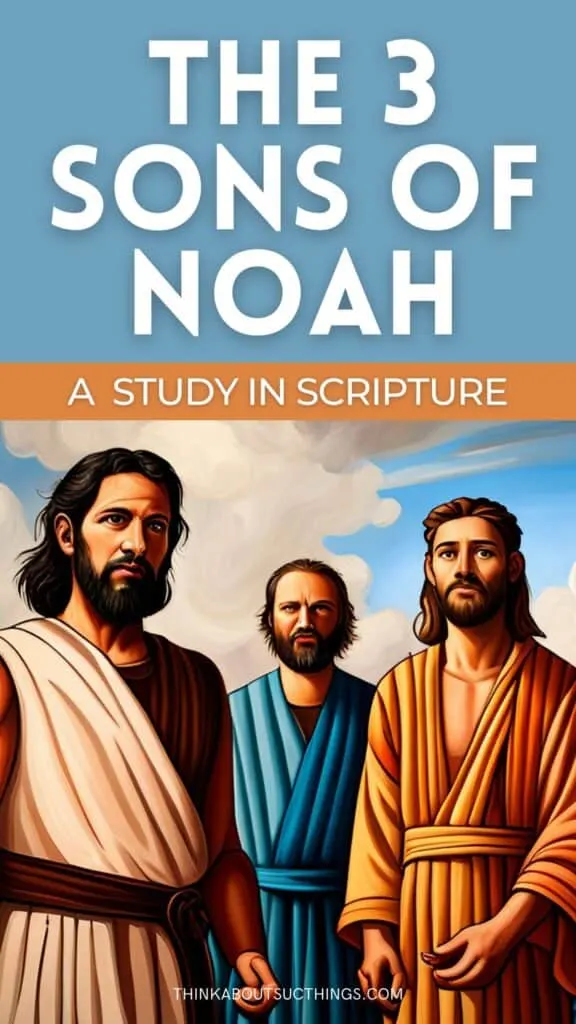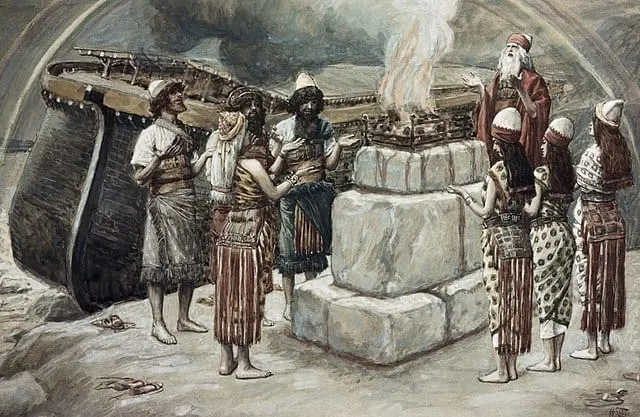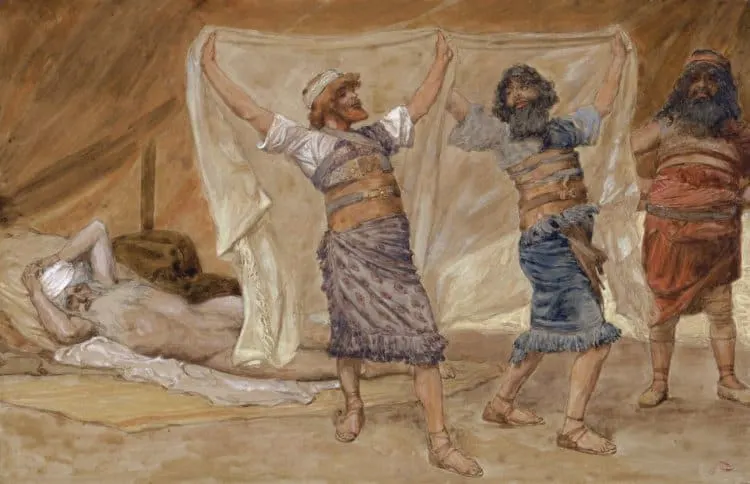In this article, we will look into Noah’s sons, who they were, what happened to them, and what effect they had on the new world. So, grab your Bible, and let’s learn…
The Bible is filled with some amazing stories, each with a message for believers today.
One story that most believers hear from a young age is that of Noah and the Ark. The story tells of a world where people had turned their backs on God, so God decided to destroy all in a flood to save one righteous man, Noah, and his family.
We are all familiar with this story but many don’t know what happened to Noah’s sons after the flood.
Genesis 6:10 tells of Noah’s three sons, Shem, Ham, and Japheth.
Noah, his three sons, and their wives, a total of eight people, were saved from the flood in the Ark when God destroyed the wicked world in a flood. God’s purpose for Noah’s sons was to repopulate the earth.
It’s neat to note that the number 8 is also associated with a new beginning in the Bible! So, eight people started the new world after the flood. Learn more about the number 8 here: The Biblical Meaning Of The Number 8
God had a plan with Noah and his sons. Although we know very little about Noah’s sons before the flood, some assume that they followed in their father’s footsteps and were righteous in the eyes of God.
There is also a line of thought that Noah and his sons were chosen because they were undefiled by the giants in the land. But that is for another article and time.
Noah also probably did not build the Ark on his own. He needed the help of his sons with this massive task, taking 100 years to complete.

Noah’s Sons
During the flood, God destroyed all the people of the earth but saved the righteous Noah and his family. He also killed all the animals but kept specific breeding pairs.
God did this to ensure that the earth could be repopulated. In Genesis 8:17, God told Noah to bring out all the animals
“…so they can multiply on the earth and be fruitful and increase in number on it.”
God then blessed Noah and his sons, telling them to..
“Be fruitful and increase in number and fill the earth.” (Genesis 9:1).
God almost destroyed the world He had made, but He saved Noah’s three sons and their wives to rebuild it. From them, all the nations of the earth descended.
It is difficult to determine which of Noah’s sons was the eldest. Scripture usually refers to them as “Shem, Ham, and Japheth,” but it was common in Biblical times to name the most important person first, not necessarily the eldest.
Genesis 9:24 confirms that Ham was the youngest of the three sons, but Genesis 10:21 was translated differently for different Bible versions, making the eldest unclear.
The NIV translation of Genesis reads: “Sons were born to Shem, whose elder brother was Japheth….”
In contrast, the ESV translation of the same verse reads: “To Shem … the elder brother of Japheth….”
The reality, however, is that Shem was more blessed than Japheth, and it was from his bloodline that Jesus Christ was eventually born.
But what else do we know about them?
The Sons of Noah: Shem, Ham, And Japheth

After they were able to leave the Ark, Noah worked the land and planted a vineyard. He got drunk after drinking some of the wine and fell asleep in his tent naked.
In Genesis 9:22, we read that Ham went into his father’s tent and saw him naked, whereafter he went and told his brothers. Shem and Japheth then covered Noah, walking into his tent backward so as not to see him naked.
What exactly happened when Ham saw his father naked, we do not know. In Jewish tradition and teaching, it is believed that Noah was raped, which brought forth the curse.
Noah blessed Shem and Japheth but cursed Canaan, Ham’s son. People often refer to the curse of Ham, but this is incorrect, as the curse was placed on Canaan only and didn’t affect the rest of Ham’s descendants.
Shem, Ham, and Japheth had children, who again had children.
In Genesis 10, we find what is referred to as “The Table of Nations,” giving a brief history of the sons of Noah and their children, indicating where they lived and who their descendants became.
The Scriptures have traced the patronymic lineage of the seventy nations to the three sons of Noah, as also the lineage of Abraham and Ishmael, and of Jacob and Esau.
Saadya’s Commentary on Genesis
The blessed Creator knew that men would find solace at knowing these family pedigrees, since our soul demands of us to know them, so that [all of] mankind will be held in fondness by us, as a tree that has been planted by God in the earth, whose branches have spread out and dispersed eastward and westward, northward and southward, in the habitable part of the earth.
It also has the dual function of allowing us to see the multitude as a single individual, and the single individual as a multitude. Along with this, man ought to contemplate also on the names of the countries and of the cities [wherein they settled].
The Descendants Of Shem

שֵׁם shêm, shame; a primitive word [perhaps rather from H7760 through the idea of definite and conspicuous position; compare H8064]; an appellation, as a mark or memorial of individuality; by implication honor, authority, character:—+ base, (in-) fame(-ous), named(-d), renown, report.
Genesis 10:21-31 tells of Shem and his descendants. Shem had five sons:
- Elam
- Ashur
- Arphaxad
- Lud
- Aram
They mainly populated the area that we know today as the Middle East.
Ashur’s descendants occupied Assyria, while many consider Aram, the father of the Aramean people, who populated Northern Mesopotamia.
The prominent name among Shem’s sons, though, is Arphaxad, who was the father of Shelah and the grandfather of Eber.
In Genesis 11: 16-26, we read about Eber’s descendants: He had a son named Peleg, whose son, Reu, had a son named Serug.
Serug had a son named Nahor, who had a son named Terah. However, one of Terah’s sons catches one’s attention.
Terah had three sons, and one of them was named Abram, who later became Abraham, the ancestor of the Israelites.
Abram was the first person in the Bible to be referred to as Hebrew, a name derived from the name of his ancestor, Eber.
Abraham was the father of Ishmael (from the slave Hagar) and Isaac (from his wife, Sarah). Isaac became the father of Esau and Jacob, who was later named Israel.
Other famous descendants of Shem include Moses, who led the Israelites out of Egypt; Joshua, who led the Israelites into Canaan, the promised land; and Samuel and David.
It was also from the bloodline of David that Joseph was born, the husband of Mary, the mother of Jesus. All of the apostles were also descendants of Jacob and, thus, descendants of Shem.
| Father | Son |
|---|---|
| Shem | Elam |
| Shem | Ashur |
| Shem | Arphaxad |
| Shem | Lud |
| Shem | Aram |
| Aram | Uz |
| Aram | Hul |
| Aram | Gether |
| Aram | Mash |
| Arphaxad | Shelah (Salah) |
| Shelah (Salah) | Eber |
| Eber | Peleg |
| Eber | Joktan |
| Joktan | Almodad |
| Joktan | Sheleph |
| Joktan | Hazarmaveth |
| Joktan | Jerah |
| Joktan | Hadoram |
| Joktan | Uzal |
| Joktan | Diklah |
| Joktan | Obal |
| Joktan | Abimael |
| Joktan | Sheba |
| Joktan | Ophir |
| Joktan | Havilah |
| Joktan | Jobab |
The Descendants Of Ham

חָם Châm, khawm; the same as H2525; hot (from the tropical habitat); Cham, a son of Noah; also (as a patronymic) his descendants or their country:—Ham.
In Genesis 10:6-20 we read about the descendants of Ham. Ham had four sons:
- Cush
- Mizraim (called Egypt in some later translations)
- Put
- Canaan
Some of Mizraim’s descendants became the Egyptians, but the Philistines also descended from him. Scholars believe that the descendants of Ham occupied parts of Asia and Africa.
Cush’s descendants settled in a country south of Egypt, which could have been Ethiopia. Cush was also the father of Nimrod, who, according to Genesis 10:9, was “…a mighty hunter before the LORD.”
Nimrod was also a mighty king in an area that included Babylon. Genesis 10:11 also credits Nimrod for building cities in Assyria, including Nineveh and Rehoboth.
In Genesis 9:25, after he awoke from his drunkenness and found out what Ham had done, Noah cursed Canaan with the words: “Cursed be Canaan! The lowest of slaves will he be to his brothers.”
It is unknown why, yet some have speculated as to why Noah cursed Canaan and not his father, Ham, but this curse was eventually fulfilled when the Israelites took over the promised land.

In Genesis 10:15-18, we read about the descendants of Canaan, who occupied the region of Palestine. This was also the land God promised Abraham that his descendants would one day inherit.
When the Israelites took over the promised land, they drove out, killed, and enslaved the Hittites, Jebusites, Amorites, Hivites, and all the other Canaanite nations.
| Father | Son |
|---|---|
| Ham | Kūš (Cush) |
| Ham | Miṣrayim |
| Ham | Fūṭ (Phut) |
| Ham | Kenaʻan |
| Kūš (Cush) | Sebā |
| Kūš (Cush) | Ḥawīlah |
| Kūš (Cush) | Savtah |
| Kūš (Cush) | Raʻamah |
| Kūš (Cush) | Savteḫā |
| Raʻamah | Ševā |
| Raʻamah | Dedan |
The Descendants Of Japheth

יֶפֶת Yepheth, yeh’-feth; from H6601; expansion; Jepheth, a son of Noah; also his posterity:—Japheth.
Japheth had seven sons:
- Gomer
- Magog
- Madai
- Javan
- Tubal
- Meshek
- Tiras.
They are believed to have settled throughout Europe and parts of Asia. One of the sons of Javan was named Tarshish.
Later in the Old Testament, in Jeremiah and Ezekiel, we read that Tarshish, located west of Israel on the Mediterranean, was the source of various metals brought to Israel.
One should note that in line with Noah’s blessing over Shem and Japheth, the descendants of both these sons lived in harmony with one another.
Scholars also believe that the blessing of Noah over Shem and Japheth in Genesis 9:26-27 came to fulfillment in the New Testament, where the Gentiles became co-heirs with the Jews in the new covenant.
| Father | Son |
|---|---|
| Japheth | Gomer |
| Japheth | Magog |
| Japheth | Madai |
| Japheth | Javan |
| Japheth | Tuval |
| Japheth | Meshech |
| Japheth | Tiras |
| Gomer | Ashkenaz |
| Gomer | Rifath |
| Gomer | Togarmah |
| Javan | Elisha |
| Javan | Tarshish |
| Javan | Kitim |
| Javan | Dodanim |
Think of this as a family tree, but instead of branches, we have a table. This is based on the information from the Targum Pseudo-Jonathan on Genesis 10:2–5. It’s like a snapshot of history, showing us how the sons of Japheth and their descendants spread out across different regions, each with its own unique cultural identity. Isn’t it fascinating to see how these ancient texts connect us with the past?
To recap…Noah had three sons, Shem, Ham, and Japheth. After the great flood destroyed the entire human race, it became their responsibility to multiply and inhabit the earth. Today, all the world’s people are descendants of Shem, Ham, or Japheth.
It’s incredible how the sons of Noah were able to repopulate the world and create the nations and countries we live in today. I hope you have enjoyed this study and that it has stirred you faith to go deeper into God’s Word.
I

Melissa is a passionate minister, speaker and an ongoing learner of the Bible. She has been involved in church and vocational ministry for over 18 years. And is the founder of Think About Such Things. She has the heart to equip the saints by helping them get into the Word of God and fall more in love with Jesus. She also enjoys family, cooking, and reading.
She has spoken in churches in California, Oregon, Texas, and Mexico and has been featured in Guidepost Magazine and All Recipes Magazine. Read More…
